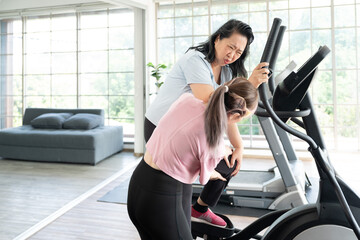
Exercise-related injuries are all too common, especially in large gyms with heavy machinery and equipment. Whether you were hurt lifting weights, using a machine, participating in a group class, or simply navigating your way through the facility, it is never fun getting hurt. If you signed a waiver when joining your gym, you may wonder whether that limits your ability to sue after sustaining an injury. The answer depends on a variety of factors. For more information and skilled legal advice, reach out to an experienced Monmouth County premises liability lawyer today.
What is a Waiver?
When you become a member at most gyms, you are typically required to sign a waiver or release of liability. A waiver is a document meant to protect the gym from possible lawsuits in the event that you become injured on the premises.
The waiver essentially states that you acknowledge the risks associated with physical activity and agree not to hold the gym responsible if you are hurt during normal activities.
Can I Sue My Gym for an Injury if I Signed a Waiver?
Waivers are designed to limit the liability of the gym, but they are not impenetrable shields that protect from any lawsuit. Even if you signed a waiver upon joining, you may be able to sue for your injury.
First, courts generally require waivers to be specific about the risks that the gym is not responsible for. If the verbiage used was not specific enough or covered topics outside of a reasonable scope, they may not hold up during a lawsuit.
Waivers typically cover injuries that arise from the normal risk of exercise, like muscle strains, sprains, minor falls, etc. However, you may have been injured due to negligence on the part of the gym or its staff that goes beyond the normal risks of working out.
Gyms must abide by premises liability laws, which state that the owner, occupant, or lessee of a property must provide lawful visitors with a safe environment free from unreasonable hazards. If the gym was negligent in some way, you may have grounds to file a lawsuit.
When Can I Sue?
Although signing a waiver does limit your ability to sue, there are many scenarios where you may have a right to pursue legal action. Anytime the gym’s negligence caused or contributed to your accident, you may have a valid claim. Below are some examples of times when you may have a case against your gym.
- The gym failed to properly inspect or maintain equipment
- The gym failed to properly supervise or lead a workout
- Your injury was caused by poor conditions like slippery floors, inadequate lighting, or tripping hazards
- Staff negligence or recklessness caused your injury
- The gym failed to provide adequate warning of the risk
- The waiver was egregious and unconscionable
If you have questions or concerns regarding your ability to sue after a gym injury, reach out to an experienced personal injury attorney today for more information and legal advice.



